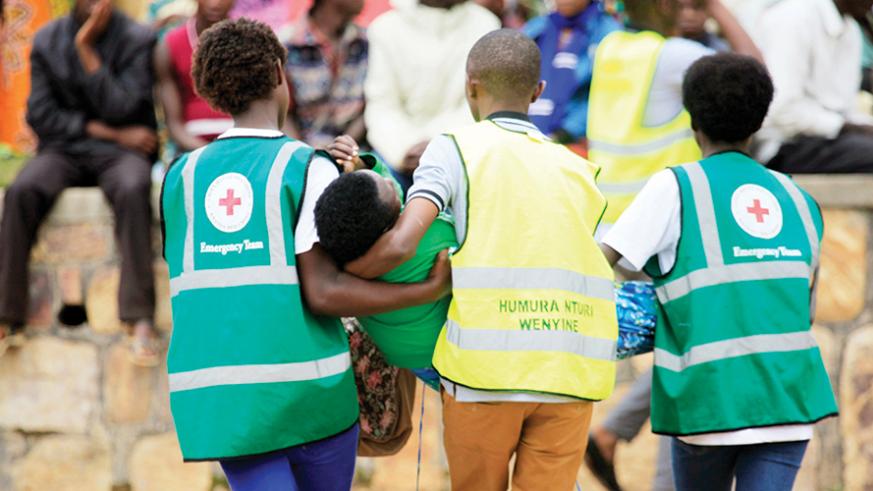
By Nasra Bishumba, The New Times
The uncertainty and instability surrounding the outbreak of COVID-19 has worsened existing well-being challenges and contributed to new mental health problems among the survivors of the 1994 genocide against the Tutsi, the Director of Survivors Fund (SURF); Samuel Munderere has said.
In an exclusive interview with The New Times on Saturday April 18, Munderere explained that the social distancing directives put in place by the government to protect citizens from contracting the coronavirus meant that most of the survivors were having challenges that are normally lessened by human contact.
“The lockdown this year, which is meant to protect all Rwandans, has come with bigger challenges for the survivors because that means that they have not been able to commemorate in the usual way where they come together, visit memorial sites and hold commemoration events. Most have had coping issues,” he said.
He said that to deal with this, SURF’s team of counsellors and Peer Support Counsellors have been providing telephone counselling to over 500 survivors. Of these, 78 cases were severe and referred to district health centres during the commemoration week which takes place every year from April 7-13.
“We are working with our partners AVEGA, GAERG, and AERG to provide counselling to Survivors by use of free helplines and a network of counsellors and Peer Support Counsellors who we provided with airtime to provide the services across the country,” he says.
Increasing support
Munderere says that SURF plans to scale counsellors from 15 and 200 Peer Support Counsellors next week.
He says that there is an urgent need for additional funding to provide mental health support to survivors over the period of this year’s commemoration of the genocide (April 7 to July 16), and beyond, in order to deal with issues resulting from the COVID-19 crisis.
Emilienne Kambibi is SURF’s Counsellor and Social Worker in Charge of Women who were raped during the genocide and the youth born out of rape.
In an interview with The New Times, Kambibi said that as a result of the COVID-19 isolation, some survivors are having flashbacks resulting from relating the current measures to curb the spread of the corona virus to the genocide.
“For instance, we are treating survivors who panic when they hear the public #StayAtHome announcements, or hear of planes repatriating foreigners. They are unable to separate today’s reality from the terrible experience where people were ordered to stay home before they were killed or how nations evacuated their citizens before the killings,” she said.
Valerie Mukabayire, the President of AVEGA-Agahozo, an association of Widows of Genocide says that besides mental health issues, survivors are still dealing with challenges that continue to slow down their healing process.
“We have women dealing with incurable diseases, physical injuries, poverty due to inability to work, legal woes, and poor housing challenges. We found it pertinent to make sure that when a counselor is dealing with the survivor’s mental health challenges, we also make sure that the other essential parts of her life are catered for,” she said.
A Rwanda Mental Health survey carried out between 2017 and December 2018 indicates that about 223,500 people sought consultation in public hospitals for mental health related treatment in 2018.
10 per cent of the above were new patients while 35.6 per cent are survivors of the 1994 genocide against the Tutsi.
The survey which saw 20,000 respondents interviewed across the country was conducted by the joint team of researchers from Rwanda Biomedical Center, University of Rwanda, the justice ministry, local government and other partners.
1,200 of the interviewees were Genocide survivors.
While depression prevalence was at 11.9 per cent in the general population, it stood at 35.6 per cent among genocide survivors. This means one of three genocide survivors faces trauma.
Need for funding
The Director of the Psychiatric Care Unit at the Rwanda Biomedical Center, Dr Jean-Damascene Iyamuremye, told The New Times last year that there was need for more funds to be injected in this area to support treatment.
“Mental health is still underfunded yet we need to coordinate activities of treatment and prevention, fighting stigma against victims and we need to raise awareness regarding access to treatment,” he said.
He added that many factors that trigger mental disorders such as poor psychological health, alcoholism, diseases such as HIV, hepatitis, cancer, poor diet, rapid development and technological changes among many others.
At least 18 percent of HIV positive people get mental health disorders while some mental conditions are related to poverty.
As of 2019, there were 12 psychiatrists specializing in mental health issues and over 2,000 psychologists in Rwanda.
